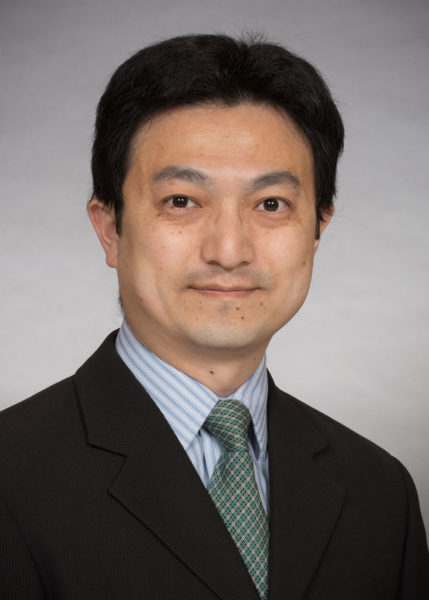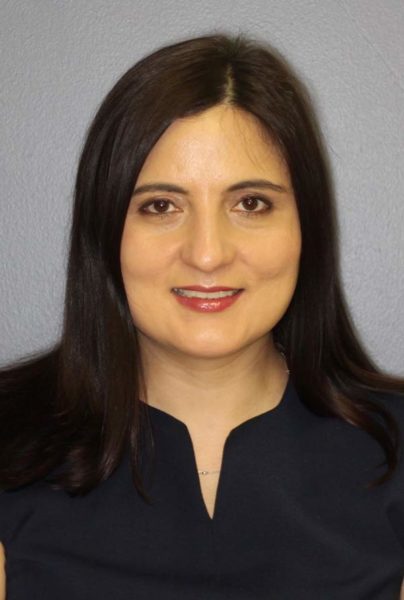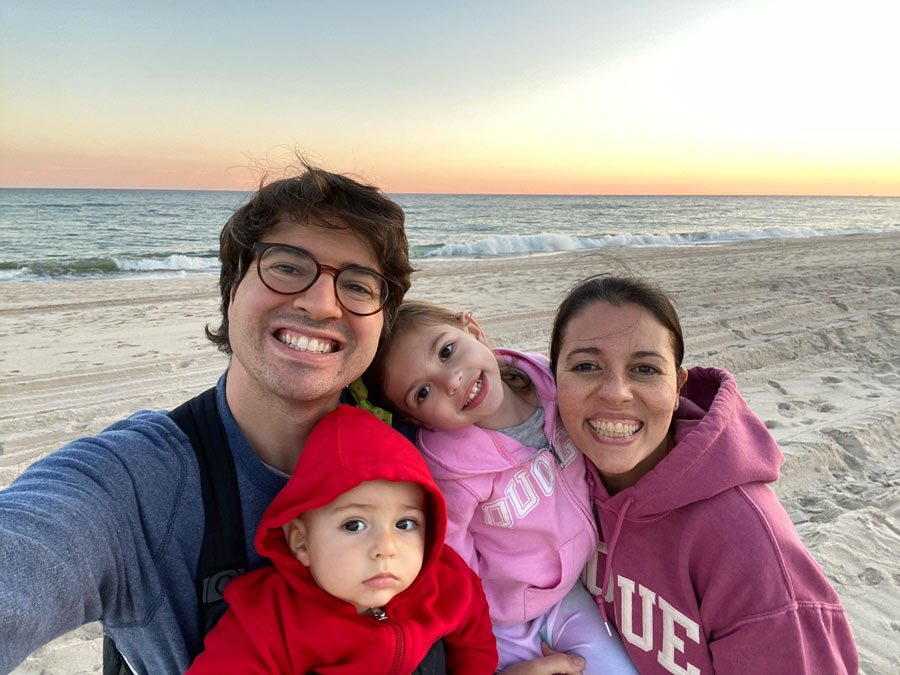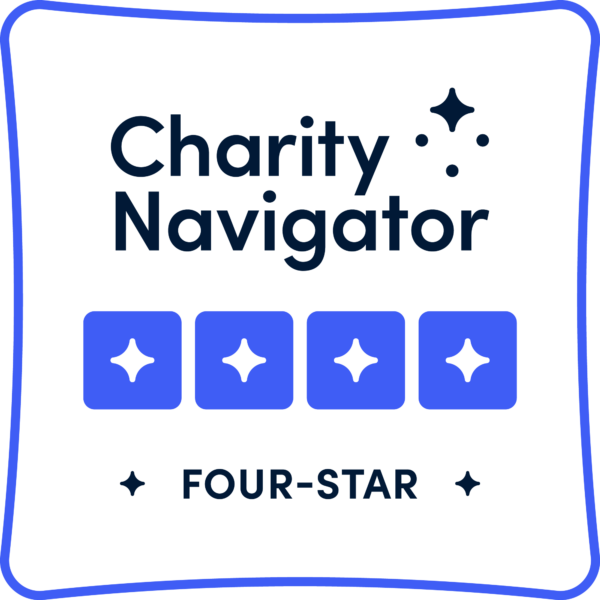Drs. Lewin and Their Sprouts — Dr. Lewin’s wife, Alana A. Lewin, MD, is a radiologist who specializes in breast imaging. They treasure their outdoor (sun-protected!) time together with their children, Isabelle, 4, and Charlie, 1.
Photo: Courtesy of Jesse M. Lewin, MD
Since 1981, The Skin Cancer Foundation has awarded more than $2 million in research grants to encourage ideas in skin cancer prevention, detection and treatment to bloom and flourish. In part 1, we spoke to David Polsky, MD, PhD chair of our Research Grants Committee, to learn the ins and outs of the program. In part 2, we meet Jesse M. Lewin, MD, a past awardee and new fundraising star for the Foundation, as well as our phenomenal 2021 grantees. Future breakthroughs are tended and made possible by people like you!
A Past Awardee Branches Out
Ten years after Dr. Polsky was awarded his grant, Jesse M. Lewin, MD, a New York Mohs and dermatologic surgeon, received an SCF Research Grant. To show his gratitude, Dr. Lewin has since become an enthusiastic fundraiser for the Foundation, on top of his roles as an assistant professor of dermatology at Columbia University Irving Medical Center, a researcher and a busy surgeon. He credits the strong mentors he had along the way for many of his interests, and it is clear that he aspires to be the same figure for the next generation. We spoke with Dr. Lewin to learn more.
How did your grant help forward your research?
I was able to look at whether postoperative phone calls, which were my standard practice after Mohs surgery, impacted patient outcomes, patient satisfaction and scar satisfaction. There are more and more metrics looking at whether patient satisfaction and patient experience impact overall care and follow-up with the doctor’s recommendations, as well as follow-up with screening and surveillance. It was just a question of how I could get a little bit of funding and resources to examine some of the questions that I had been interested in.
Receiving the grant was a tremendous honor. The project itself has continued my interest in patient care and patient satisfaction. I think one of the most important things we can do as doctors is to take care of patients while we’re treating and curing the disease, to connect with them and respect where they’re coming from. I think that’s why I feel passionately about patient satisfaction.
Why did you stay involved with The Skin Cancer Foundation?
I got involved in the Foundation through physicians and mentors who had the most impact on me, such as Liz Hale (Elizabeth K. Hale, MD, a senior vice president of the Foundation). They always spoke so highly of the organization, so that was my launching-off point.
It’s great to be on the cutting edge, but you also have to be a good surgeon and a good doctor. If you can’t relate to patients in a way that they can understand, then you’re not going to connect. That is one thing I like about The Skin Cancer Foundation’s mission and this magazine, too: It’s getting out there to educate as many people as possible.
I see the value in being able to raise money for The Skin Cancer Foundation. Almost all of my donors are family friends and some patients. I’m touched by their donations because they understand the cause but also because it’s a reflection of me. They see what I do and how much I care about my patients. That’s why they’re doing it — because they think that if I believe in something, then they want to contribute to it. It’s an honor.
What motivates you professionally?
Saving lives — and detecting early stage rather than late-stage melanomas and SCCs. I like the challenge of taking care of a high-risk group of patients who need good, attentive care, like solid organ transplant recipients. We have a large population of those patients at Columbia.
I feel fortunate to be surrounded by outstanding and bright colleagues at Columbia. And as the director of dermatologic surgery education, I try to find novel ways to teach our residents. In addition to clinical care and research, my focus is hands-on education. I also just got involved, through Columbia, as the advisor for medical students who are teaching sun protection in elementary and high schools in New York. I oversee medical students who then do sun education lecture series. You could say that getting involved in the community like that was inspired by The Skin Cancer Foundation. I also enjoy my time spent on the admissions committee for the Columbia University Vagelos College of Physicians and Surgeons.
How do you balance your demanding work life with family time?
My favorite thing is spending time with my family in Quogue at the beach. We love swimming, whether in the ocean or in a pool — but always with proper sun protection! When it’s safe again, I’m really looking forward to having my kids spend time with their grandparents without masks and staying at my parents’ house on Long Island. My wife and I are very close with our families and love being with them.
Meet Our Next Crop of Seedlings — The 2021 Research Grant Awardees!

Harper N. Price, MD, loves the outdoors, but always wears proper sun protection.
Dr. Marcia Robbins-Wilf Research Grant Award
$25,000
Awardee: Harper N. Price, MD, Chief, Division of Dermatology, Phoenix Children’s Hospital
Title of project: “Skin Cancer Education and Prevention in Pediatric Organ and Hematopoietic Stem Cell Transplant Recipients: Developing a Skin Cancer Prevention Program at Phoenix Children’s Hospital.”
How would you explain your research?
With exciting advances in pediatric oncology and transplant medicine comes an evolving yet uncommonly discussed risk for childhood cancer and transplant survivors — increased risk of skin cancer! Although adult transplant recipients often have access to collaborative skin cancer screenings, clinics for pediatric patients have not been established. Our project will serve as the first of its kind to develop an educational intervention program for pediatric transplant patients and providers, regarding sun safety and skin cancer risk and monitoring. We will also develop infrastructure to ensure all transplant patients at our institution will have access to yearly skin cancer screenings.
What does this grant mean to you?
As a pediatric dermatologist, I am passionate about the skin conditions of children with complex medical needs. After collaborating with the Phoenix Children’s Hospital transplant programs and Center for Cancer and Blood Disorders, I quickly realized so much more was needed for this pediatric population from us as pediatric dermatologists. This grant will not only fulfill a personal and professional goal of mine, to educate children and young adults and their care teams regarding skin cancer, risk factors and sun safety, but will also contribute to the current, sparse science about skin effects in pediatric cancer/transplant survivors. I hope that this project and program’s output will lead to further funding opportunities and expansion of this model throughout the southwest and beyond. “To infinity, and beyond!”, words by the famous character Buzz Lightyear, could not ring truer for me, with this grant opportunity.

Masaoki Kawasumi, MD, PhD, is based in Seattle, where the Trenners, who have generously funded his grant, coincidentally also live.
Ashley Trenner Research Grant Award
$50,000
Awardee: Masaoki Kawasumi, MD, PhD, Assistant Professor, Division of Dermatology, University of Washington School of Medicine at South Lake Union
Title of Project: “Mechanisms of Myc-Associated Super-Enhancer Formation in Melanoma and cSCC”
How would you explain your research?
Super-enhancers are regions of the genome that strongly activate expression of genes that play a role in cell identity. Abnormal super-enhancers form in cancer cells, leading to uncontrolled cell growth and the ability for the cancerous cells to spread to other sites in the body (malignancy). These super-enhancers could be therapeutic targets to inhibit malignancy, but it is unclear how super-enhancers are generated in aggressive skin cancer such as melanoma. We aim to uncover the functional role of super-enhancers in driving malignancy and provide insight into how they can be targeted as potential treatments.
What does this grant mean to you?
With this grant, I will be able to conduct my own research and take some important steps to translating scientific discoveries into clinical practice for skin cancer patients and families. I greatly appreciate the support from The Skin Cancer Foundation and the generosity of the Trenner family who makes my research possible.

Neda Nikbakht, MD, PhD, was also awarded The Todd Nagel Memorial Research Grant Award in 2017 when she was studying melanoma. This time, she is looking into the rare skin cancer CTCL.
Todd Nagel Memorial Research Grant Award
$50,000
Awardee: Neda Nikbakht, MD, PhD, Assistant Professor of Dermatology, Director, Cutaneous Lymphoma Clinic, Department of Dermatology and Cutaneous Biology, Thomas Jefferson University, Philadelphia
Title of project: “Immunosuppressive Role of Toll-like Receptor 4 Signaling in Cutaneous T-cell Lymphoma”
How would you explain your research?
We are going to study how different components of the skin microenvironment promote cutaneous T-cell lymphoma (CTCL). Specifically, we will examine the interactions between the skin scaffolding matrix and traveling immune cells in CTCL. In CTCL, they interact through a receptor called Toll Like Receptor 4 (TLR4), and we aim to establish how TLR4’s activity leads to progression of CTCL. We hope that the outcome of this research will be to discover new therapeutic targets, such as TLR4, for the treatment of CTCL.
What does this grant mean to you?
Receiving this grant allows us to examine this concept with the ultimate goal of finding new targets in treatment of skin cancer. Furthermore, this award will put us in a position to receive substantial federal support in the near future to expand our skin cancer research program.





